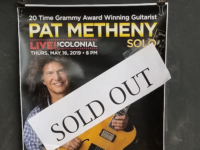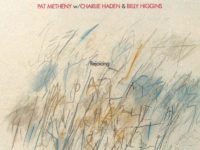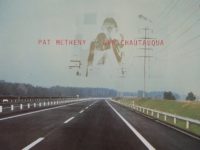Pat Metheny and John Zorn? What are both musicians famous for? Metheny constructs compositions spun from gorgeous and seemingly endless long-form melodies. Zorn shakes the noise from film noir, Klezmer, jazz, and blues. If you give both artists a superficial read, the areas of overlap aren’t obvious. A deeper look reveals this: Ornette Coleman. In addition to his phenomenal collaboration with Ornette on Song X, Metheny covered several Coleman compositions on 80/81 and Rejoicing. Zorn’s tribute to Ornette came in the form of the bracing and exhilarating Spy Vs. Spy.
And then…there’s the noise. My first John Zorn record was Naked City, which contains one of my favorite Zorn moments: the entire band blowing their brains out for a spell before dropping right back in the pocket on a crazed version of “The James Bond Theme.” Metheny is no stranger to noise either. Some fans, used to his gentler side, were repulsed by Song X. But that record was relatively tame when compared to the noise-fests on The Sign of 4 and Zero Tolerance For Silence.
If somebody had asked me what I’d hope for in a Pat Metheny/John Zorn pairing, I just might have gone for the skronk. Just imagine Zorn letting loose on the sax with Pat joining in with blasphemous guitar synth blasts. Well, I’m glad that my wish was not granted for as much as I love violently-disturbed air molecules, the just-released Tap: John Zorn’s Book of Angels, Vol. 20 provides a far more expansive look at what ends up being some terrific Zorn/Metheny alchemy.
For Tap John Zorn culled six entries from his enormous Masada songbook, which were then brought into the Pat Metheny context. Metheny played all of the instruments (from the Orchestrion to various guitar-like things to keyboards to the piano and flugelhorn) with Antonio Sanchez sitting behind the drum kit. The resulting program is multi-faceted, complex, and beautiful.
In a recent interview with the BBC, Pat spoke of how Zorn’s pieces (referred to by Zorn as his “little ditties”) can “withstand whatever you throw at them.” Metheny does indeed throw a lot at these compositions. In many cases, you can almost get a sense of Pat’s inspiration as he takes segments of melodic material and expands upon them. And so we have the opening track “Mastema” retaining the Klezmer roots of its basic melody, but with Metheny extending it with electric sitar, backward guitar parts and a looped percussive feel. Three quarters of the way in and a distorted electric guitar enters, foreshadowing the song’s final descent into blurpy electronic decay. That same energy level is present in quite a different form on the closing “Hurmiz,” which can be thought of as a high-stakes “duet” between Pat (on piano, of all things) and Sanchez at the drums. The melody is presented, taken apart, and driven into the sky.
None of this is to say that Tap lacks for moments of introspection. “Albim” takes a more purely acoustic approach that enhances the Masada-feel of the composition, while “Phanuel” intersperses nearly ambient sections of quiet with bombastic and nightmarish noise. I want to say that this is my favorite track…but I want to say that about all of them.
In the music world, there can be a danger in collaboration. Some of them (especially when we’re dealing with the “supergroup” category) can fall flat, somehow managing to be less than the sum of their parts. With Tap, many of the composition bloom to showcase the essential qualities of both artists. Give “Tharsis” a listen and you’ll see what I’m getting at. Reminiscent of Metheny’s “The Heat Of The Day” (from Imaginary Day), Pat plays the insistent theme on fretless guitar before the rhythm section enters. Even as the sonic scene shifts (and shift it does, with Metheny bringing the full force of the guitar synth), the flavor of the original melody is never lost. It is one of Tap‘s many high points and is one of many reasons why it will be difficult to find another album that will unseat this one for the Best Record of 2013.
Tap: John Zorn’s Book of Angels, Vol. 20 was released jointly by Tzadik and Nonesuch on May 21, 2013.
[amazon_enhanced asin=”B00BY8DC7U” container=”B00136LTXM” container_class=”” price=”All” background_color=”FFFFFF” link_color=”000000″ text_color=”0000FF” /] [amazon_enhanced asin=”B00CSMTB30″ container=”B00136LTXM” container_class=”” price=”All” background_color=”FFFFFF” link_color=”000000″ text_color=”0000FF” /] [amazon_enhanced asin=”B00C8CUEC2″ container=”B00136LTXM” container_class=”” price=”All” background_color=”FFFFFF” link_color=”000000″ text_color=”0000FF” /] [amazon_enhanced asin=”B00CNYCD0G” container=”B00136LTXM” container_class=”” price=”All” background_color=”FFFFFF” link_color=”000000″ text_color=”0000FF” /]
- How Eric Clapton’s ‘Me and Mr. Johnson’ Made the Case for British Blues - March 20, 2024
- Why Todd Rundgren’s ‘Back to the Bars’ Remains So Powerful - December 13, 2023
- Reevaluating Bruce Springsteen’s ‘The Wild, the Innocent and the E Street Shuffle’ - September 11, 2023




